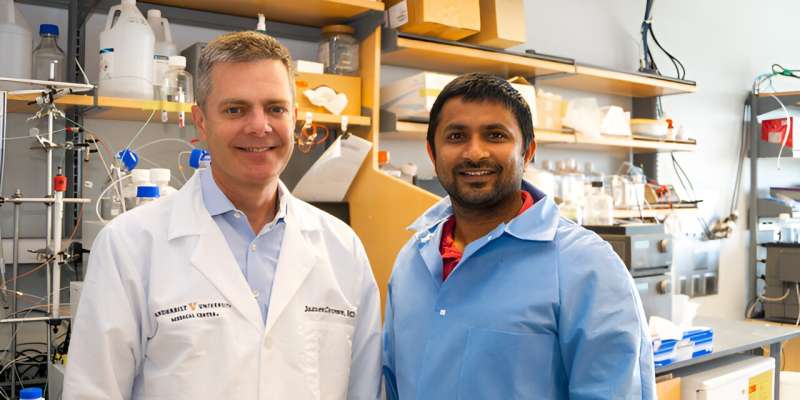This article has been reviewed according to Science X's editorial process and policies. Editors have highlighted the following attributes while ensuring the content's credibility:
fact-checked
peer-reviewed publication
trusted source
proofread
Researchers discover antibody that neutralizes both RSV and human metapneumovirus

Vanderbilt University Medical Center and Stanford University researchers discovered a potent, cross-neutralizing human monoclonal antibody against the respiratory syncytial virus (RSV) and human metapneumovirus (hMPV).
The findings, published July 28 in Cell Host and Microbe, describe not only the potency of the RSV-199 antibody but the mechanisms through which it cross-neutralizes eight different strains of RSV and hMPV infection in mice. This discovery marks a crucial step in developing and designing a single vaccine against both pathogens.
"When we talk about antibody potency for other pathogens, we generally describe the half-maximal inhibitory concentration—the amount of antibody needed to neutralize the target by 50%—in micrograms per milliliter. But for RSV-199, we're talking in nanograms per milliliter, a thousandfold difference," said Naveenchandra Suryadevara, Ph.D., a senior staff scientist at the Vanderbilt Vaccine Center (VVC).
Suryadevara is the paper's co-first author with Xiaolin Wen, a research associate in the lab of Theodore Jardetzky at Stanford University.
RSV is the most common cause of airway inflammation and pneumonia in children under the age of one. In late 2022, RSV infections spiked nationwide, prompting a redoubling of efforts toward finding new treatments for the virus by government agencies and medical institutions, including the VVC. HMPV, discovered in 2001, is in the same family of viruses as RSV and is the second most common cause of wheezing and pneumonia in children.
"Once we discovered that this antibody could bind to both RSV and hMPV on the prefusion-F protein, we wanted to understand the possible mechanism for this cross-neutralization," Suryadevara said, "so we turned to our collaborators at Stanford who did a structural analysis of RSV-199 and the RSV prefusion-F protein using high-resolution cryo-electron microscopy."
This analysis revealed that the antibody targets a specific site called site III on the prefusion-F protein of RSV and hMPV viruses, preventing fusion with host cells and subsequent infection. Additionally, RSV-199 has a longer CDR3 region than typical RSV and hMPV antibodies, allowing it to bind to both RSV and hMPV.
While further study is needed to design a treatment with the RSV-199 antibody, Suryadevara hopes to bring RSV-199 head-to-head with Astra Zeneca's RSV antibody, nirsevimab, which received FDA approval for use in infants.
Suryadevara explained, "The two antibodies are quite similar in terms of their neutralizing capacity of RSV strains, but RSV-199 can additionally neutralize hMPV. It's a great antibody that has real therapeutic potential."
More information: Xiaolin Wen et al, Potent cross-neutralization of respiratory syncytial virus and human metapneumovirus through a structurally conserved antibody recognition mode, Cell Host & Microbe (2023). DOI: 10.1016/j.chom.2023.07.002


















